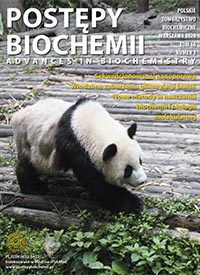Congenital disorders of glycosylation - constantly growing group of metabolic diseases.
DOI:
https://doi.org/10.18388/pb.2020_345Abstract
Congenital disorders of glycosylation (CDG) are a group of genetic disorders caused by abnormal N- and O-glycosylation pathway of proteins and lipids. The glycosylation process plays an important role in the proper functioning of the body and its disorder leads to serious clinical defects. The clinical picture is extremely heterogeneous, including symptoms involving many organs or systems with predominantly neurological manifestation.A broad clinical phenotype poses a challenge in CDG diagnosis. A large group among CDG are defects associated with protein N-hypoglycosylation. A simple test its diagnosis is isoelectrofocusing (IEF) of serum transferrin which is still the "gold standard" in the diagnostics. Normal isoform transferrin profile does not rule out all glycosylation defects. Molecular diagnostics play an important role and the dissemination of next generation sequencing (NGS) has allowed new disorders to be identified.
Downloads
Published
Issue
Section
License
Copyright (c) 2020 Advances in Biochemistry

This work is licensed under a Creative Commons Attribution 4.0 International License.
All journal contents are distributed under the Creative Commons Attribution-ShareAlike 4.0 International (CC BY-SA 4.0) license. Everybody may use the content following terms: Attribution — You must give appropriate credit, provide a link to the license, and indicate if changes were made, ShareAlike — If you remix, transform, or build upon the material, you must distribute your contributions under the same license as the original. There are no additional restrictions — You may not apply legal terms or technological measures that legally restrict others from doing anything the license permits.
Copyright for all published papers © stays with the authors.
Copyright for the journal: © Polish Biochemical Society.




